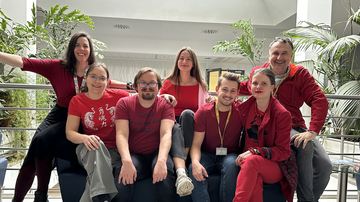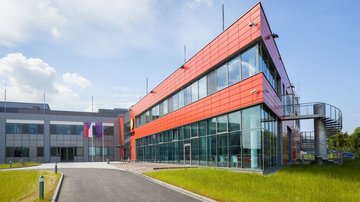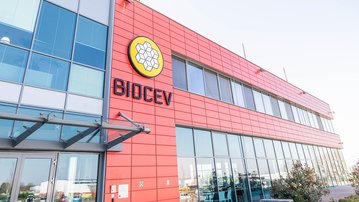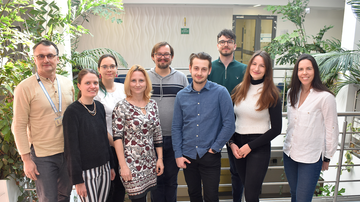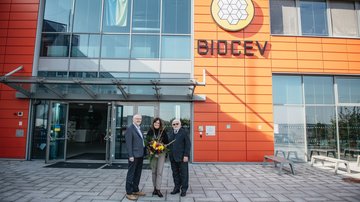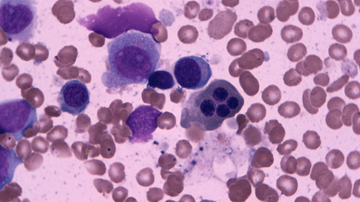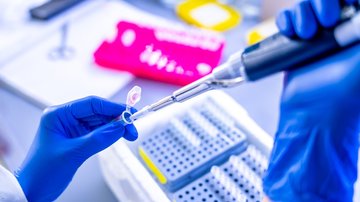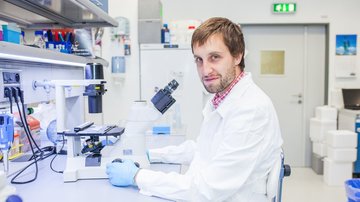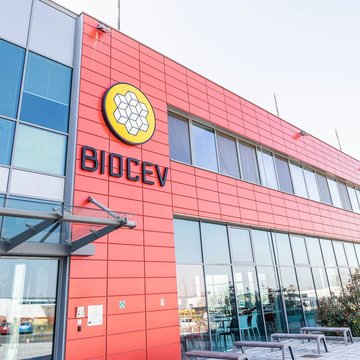
Laboratory of Haematooncology and Stem Cells
The research centre the faculty deserved
The Biotechnology and Biomedicine Centre of the Academy of Sciences and Charles University (BIOCEV) has been operating for eight years in Vestec near Prague. Since its inception, it has been a unique research platform, a cutting-edge scientific facility with an international reach. The BIOCEV Centre has been producing a growing number of publications, patents, industrial designs and prototypes that have greatly contributed to making the Centre’s more visible. The First Faculty of Medicine at Charles University has its own laboratories in the Centre that form an independent institute headed by Prof. Tomáš Stopka. In addition, the Centre’s research groups establish collaboration with other institutes and clinics of the First Faculty of Medicine at Charles University in order to accelerate the introduction of new technologies into clinical practice. The number of applied outputs that are of interest to the general public is likely to increase over time. However, the BIOCEV centre not only conducts research, but also teaches undergraduate, graduate and doctoral courses. The aim is to provide the best possible conditions for students in a friendly atmosphere.
“Since the 1990s, it had been obvious that our faculty, with its great scientific potential, ‘deserved’ a modern research centre with excellent equipment. At first, it was perhaps the dream of some of our colleagues who had the foresight to see what the trends in global research were,” says the Dean of the First Faculty of Medicine at Charles University, Prof. Martin Vokurka, who goes on to reiterate that realizing the BIOCEV project was not easy. “At that time, the idea of a joint research centre of the Czech Academy of Sciences and Charles University was far from obvious, and on top of that, the City of Prague was excluded from participating in a number of subsidy programmes. In the end, however, the project was successfully realised thanks to the persistent efforts of Prof. Milan Elleder, who unfortunately did not live to see its full completion, Prof. Pavel Martásek, who became the Scientific Director of the Centre, and other colleagues from the faculty,” notes the Dean of the First Faculty of Medicine at Charles University. Here, it is also necessary to acknowledge the former Dean of the First Faculty of Medicine at Charles University, Prof. Aleksi Šedo, for his support of this project. At the end of 2015, joint efforts made it possible to build an internationally competitive scientific centre in Vestec, just outside of Prague.
The BIOCEV project was initiated by the Academy of Sciences and initially coordinated by Prof. Peter Šebo, but it is also necessary to acknowledge Prof. Václav Hořejší, who made enormous long-standing efforts to help develop and complete the project. BIOCEV is a joint centre of six institutes of the Czech Academy of Sciences – The Institute of Molecular Genetics, The Institute of Biotechnology, The Institute of Microbiology, The Institute of Physiology, The Institute of Experimental Medicine, The Institute of Macromolecular Chemistry – and two faculties of Charles University in Prague – the Faculty of Science and the First Faculty of Medicine.
Today, it is a well-established centre of excellence in basic research. Its scientific work is divided into five programmes – Functional Genomics, Cell Biology and Virology, Structural Biology and Protein Engineering, Biomaterials and Tissue Engineering, and the Development of Diagnostic and Therapeutic Procedures.
A successful contribution to the quality of Czech science
“High-quality results depend on good instrumentation, equipment and, above all, on educated and smart people. Science is a dynamic endeavour where it is difficult to succeed not only in terms of results but also in obtaining research funding. At the beginning, BIOCEV was lucky in that the groups that joined the Centre were able to use start-up grants, acquire equipment, and there was also a five-year period under the National Sustainability Plan. During that time, the organisation and concept of our participation in the Centre evolved. A separate faculty institute was created, while some laboratories remained affiliated with the original institutes. New groups joined BIOCEV, while some others moved back to their original faculty premises,” says Prof. Vokurka, explaining the conditions in which the Centre was formed.
The main source of funding for building the BIOCEV Centre was the European Regional Development Fund, which granted funds to the Centre as a European Centre of Excellence. “Thanks to national and European investments in large research centres like BIOCEV, a successful contribution was made to help improve the quality of Czech science. Our teams regularly publish in leading journals, receive patents for their discoveries and, in turn, significantly contribute to the overall prestige not only of the BIOCEV Centre, but also of Czech science,” emphasises the Scientific Director of BIOCEV, Prof. Pavel Martásek, who is also a member of the Department of Paediatrics and Inherited Metabolic Disorders at the First Faculty of Medicine at Charles University and the General University Hospital.
Emphasis placed on international reach
The BIOCEV Centre places emphasis on integrating into the European Research Area project and international co-operation in general. Prof. Martásek considers involvement in international research consortia to be crucial. “International collaboration increases our teams’ expertise and efficiency, and strengthens their relevance and importance within the international research landscape,” says Prof. Martásek, who is pleased that – in addition to the Centre’s involvement in joint scientific projects with various academic and university teams and in national and international programmes – the BIOCEV Centre has been able to attract many scientists from abroad.
BIOCEV has established international partnerships and collaborations with institutions in most European countries, including universities in Leuven, Paris, Oslo, Lund, Zurich, Heidelberg, Vienna, Warsaw, Krakow, Milan, Rome, Barcelona, and Madrid. “During the construction of BIOCEV, a selected group of the Centre’s future employees visited a number of selected centres and institutions to discuss their work and research organisation. This allowed us to establish contacts that have continued to gradually develop, sometimes resulting in the submittal of joint projects. As part of this programme, we visited the Vienna Biocenter, EMBL Heidelberg, the Institut Jacques Monod in Paris, institutes in the Netherlands and Belgium, universities in Tel Aviv, Jerusalem, Beersheba and of course the Weizmann Institute in Rehovot,” says Prof. Martásek.
In the Czech Republic, BIOCEV collaborates, for example, with the Technical University of Liberec, CEITEC in Brno, the Institute of Translational Medicine in Olomouc, the Biomedical Centre of the Faculty of Medicine of Charles University in Pilsen, and the South Bohemian Research Centre of Aquaculture and Biodiversity of Hydrocenoses (CENAKVA). In addition, the Centre co-operates with other projects in the Czech Republic, commercial entities, and regional and local authorities. In addition there are some Czech biotechnology firms in BIOCEV’s immediate vicinity which are already quite successful.
Research groups with many success stories
There are 12 research groups that operate within BIOCEV at the First Faculty of Medicine at Charles University (the research groups headed by Prof. Tomáš Stopka, Doc. Jiří Petrák, Dr. Milan Jakubek, Doc. Ondřej Havránek, Dr. Peter Dráber, Dr. Miroslav Hons, Dr. Radoslav Janoštiak, Dr. Zdeněk Kostrouch, Prof. Karel Smetana, Prof. Stanislav Kmoch, Dr. Marie Zikánová, Dr. Zora Mělková, Dr. Jiří Zahradník) that are involved in the five research areas listed above. The long list of achievements includes, for example, the research and development of effective anticancer agents and new mechanisms of tumour resistance of leukaemia cells, the preparation of the concept of migrastatics, the nanoformulation of a number of drugs, and the development of an inhaled drug that works against COVID-19. Biomedical teams participate in grant competitions and work on joint long-term projects.
The organisational unit brings together theoretical and clinical research, and some groups have been able to translate their results into practical and even commercial applications, which can then contribute to securing further funding for science. “Biomedical research is developing well at the Centre. Co-operation on various projects with other institutes, departments and clinics of the First Faculty of Medicine at Charles University is a logical step if we want to significantly accelerate the introduction of new technologies into clinical practice. In addition to departments and clinics, there are also ongoing projects with purely commercial entities that have resulted in the filing of major patent applications,” says Prof. Martásek, adding that every research centre undergoes a period of several years from its opening to full productivity. This is no different for the BIOCEV centre. “Even though BIOCEV is conceived as a basic-research institution, sooner or later there will always be applications. We currently have more than twenty patents, industrial designs, and prototypes,” explains Prof. Martásek.
In past issues of the Jednička magazine, readers could read about a number of research groups from BIOCEV at the First Faculty of Medicine at Charles University (www.lf1.cuni.cz/jednicka-ve-vede). In the current issue, the research group headed Doc. Jiří Petrák is featured on page 11. The most recent research group to be established at the BIOCEV Centre at the First Faculty of Medicine at Charles University is the virology group headed by Dr. Jiří Zahradník. From the very beginning, it was planned that virology would be one of the areas pursued at the Centre – this also involved setting up the biosafety level 2 (BSL2) laboratory, which – among other things – was significantly involved at the beginning of the COVID-19 pandemic, as it helped introduce testing for the SARS-CoV-2 virus.
Its origins are described by Prof. Tomáš Stopka, Head of the BIOCEV Institute of the First Faculty of Medicine, Charles University. “The team started its activities as part of the development of the virology programme in the autumn of 2022 and is headed by Dr. Jiří Zahradník, whom we recruited through an open selection procedure after his long-term stay at the Weizmann Institute of Science in Israel. Dr. Zahradník received the prestigious Primus grant from Charles University to start the laboratory, as did all the new research group heads whom we have gradually recruited for BIOCEV. Dr. Zahradník also joined an Exceles project of the National Institute of Virology and Bacteriology, winning a prestigious position for an emerging research group in the area of COVID-19 research. This is also related to the current conversion of the original BSL2 to BSL3, which will meet more stringent requirements for working with dangerous viruses,” explains Prof. Stopka.
Education and teaching as an integral part of the Centre
The research activities of the BIOCEV Centre at the First Faculty of Medicine at Charles University are interlinked with providing education and teaching for doctoral students. In addition, seminars are held at the Centre as part of the Biomedicine & Biotechnology course for undergraduate and graduate students. The centre offers internships and actively recruits Ph.D. students.
“Recruitment is done in a collaborative manner, i.e. with all key partners meeting under one roof. Ph.D. candidates thus have the opportunity to meet their preferred supervisors and talk to them,” says Prof. Tomáš Stopka, adding that all information is clearly outlined on the BIOCEV website, under the “education” subfolder, and there is also a questionnaire where each candidate can tick the laboratories they are interested in. “As a result, both the candidate and the supervisor have more options and can actually choose the person that meets their expectations. Doctoral studies are very demanding and, especially at the beginning, require a lot of motivation and resolve. We strive to provide the best possible conditions for doctoral students to study and interact within the entire BIOCEV Centre – a cutting-edge research centre with a friendly atmosphere prevails,” concludes the Head of BIOCEV at the First Faculty of Medicine at Charles University.
Author: Lukáš Malý
The article was published in Jednička (First Faculty of Medicine, Charles University), 1/2023




